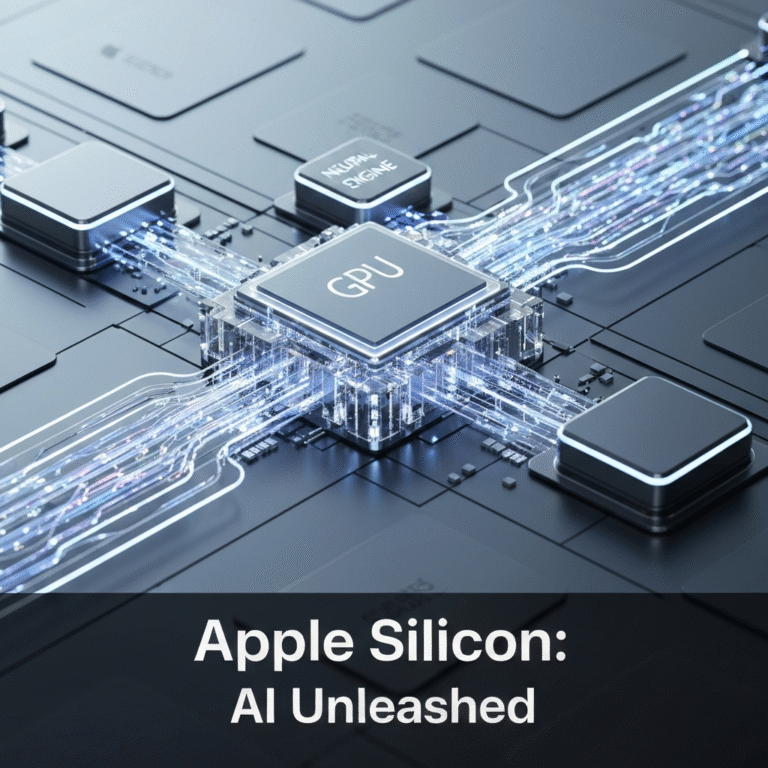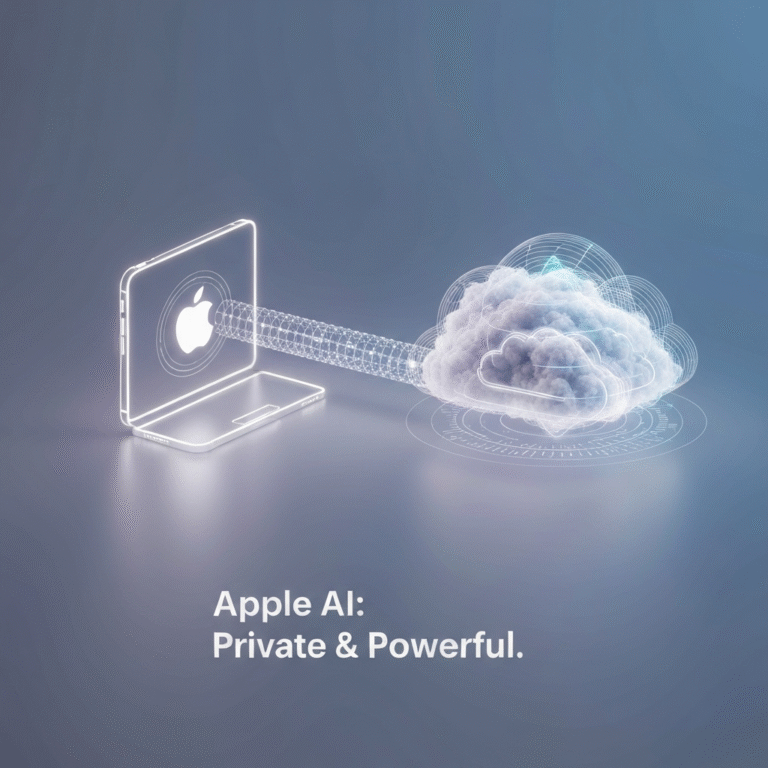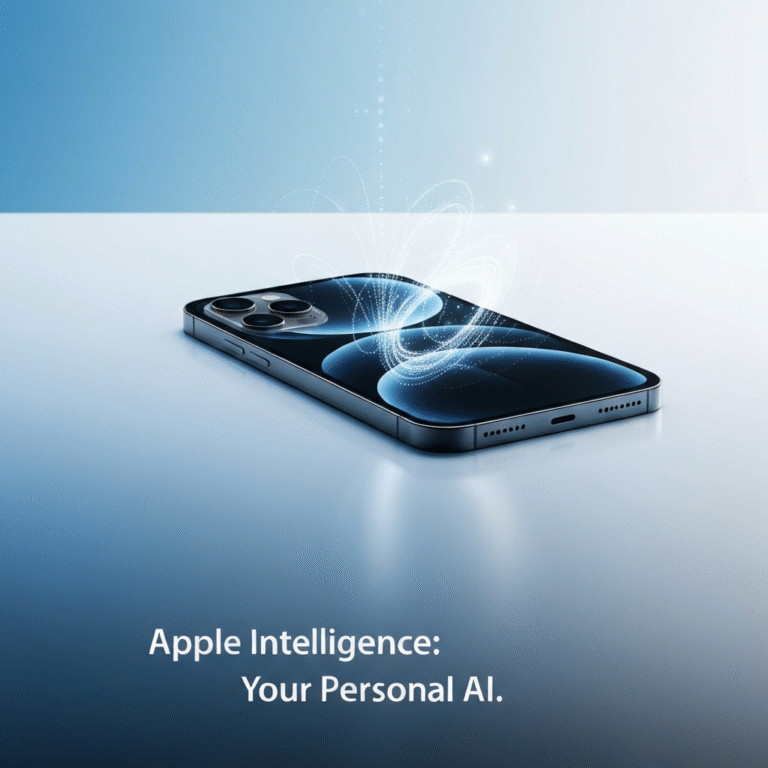
Apple has officially entered the AI race with Apple Intelligence, a system promising to revolutionize how we interact with our devices. But amidst the marketing hype and complex terminology, a simple question remains: What is Apple Intelligence, really? As an AI Automation Engineer, my goal is to cut through the noise. This is not just another feature list. This is a comprehensive guide to demystify Apple's AI, explaining the core technology that powers it, why your privacy is central to its design, and—most importantly—addressing its real-world limitations and the controversies already emerging. We'll explore how it works, who can use it, and whether it truly lives up to its ambitious promises, providing the clarity you won't find elsewhere.
Core Understanding & Technology
Defining Apple Intelligence: More Than Just an AI Feature
So, what is Apple Intelligence? At its core, Apple Intelligence is not a single app or a chatbot like ChatGPT. Instead, it's a deeply integrated system of personal intelligence that works across Apple's core applications on iOS 18, iPadOS 18, and macOS Sequoia. The Apple AI system definition centers on using personal context—your emails, messages, calendar, photos, and on-screen activity—to provide assistance that is uniquely relevant to you.
Unlike general-purpose AI that pulls from the broad internet, Apple Intelligence is designed to understand you. It can summarize a long email thread, find a specific photo based on a vague description, or create a custom emoji of your friend based on their picture. Understanding Apple Intelligence means recognizing its goal: to make your device a more helpful, context-aware partner without compromising your personal data. It's a system built on a foundation of smaller, specialized AI models that work together, rather than one giant model trying to do everything.
How Apple Intelligence Works: On-Device vs. Private Cloud Compute
The real innovation in how Apple Intelligence works lies in its hybrid processing model. The system operates in two primary ways: on-device processing and Private Cloud Compute.
| Processing Method | How It Works | Key Privacy Feature |
|---|---|---|
| On-Device Processing | Handles the majority of tasks directly on your device using Apple silicon. This is the default for requests involving personal data. | Inherently private. Your personal information never leaves your device, ensuring maximum security. |
| Private Cloud Compute (PCC) | For more complex requests, data is sent to secure, custom Apple silicon servers for processing. | Data is never stored and is cryptographically inaccessible to Apple. The system is independently auditable. |
A New Standard for AI Privacy
Privacy is not an afterthought; it's the central pillar of the entire system. The commitment to Apple Intelligence privacy is evident in its architecture. By prioritizing on-device processing, Apple drastically reduces the amount of data sent to servers.
When data must be sent to the cloud, Private Cloud Compute privacy features ensure it remains protected. Your request is sent with only the necessary context, and it's processed in a secure enclave that Apple itself cannot access. This approach to Apple Intelligence data security directly addresses the biggest fear users have about AI: how their personal information is being used. These Apple AI privacy features set a new benchmark for the industry, a topic explored further in Apple's 2025 AI and privacy policy updates.
Features, Availability & User Experience
Key Features: What Apple Intelligence Can Actually Do
The Apple Intelligence features list is extensive and integrated directly into the apps you already use. It's less about a single "wow" feature and more about hundreds of small enhancements that make your device smarter. Key Apple Intelligence capabilities include:
| Feature | Description |
|---|---|
| Writing Tools | System-wide tools to rewrite, proofread, and summarize text in apps like Mail, Notes, and Pages. |
| Image Playground | Create unique images in various styles (Animation, Illustration, Sketch) integrated into apps like Messages. |
| Genmoji | Generate custom emoji on the fly from text descriptions or photos of your friends. |
| Siri Enhancements | Makes Siri more natural and context-aware, with the ability to understand on-screen content and take actions within apps. |
| ChatGPT Integration | Optionally uses ChatGPT (GPT-4o) for broad world knowledge, always asking for permission before sending a query. |
Device Compatibility: Who Gets Apple Intelligence?
A crucial point of confusion is which devices are compatible with Apple Intelligence. Due to the heavy on-device processing requirements, the feature is limited to devices with the most powerful Apple silicon.
| Device Category | Minimum Requirement |
|---|---|
| iPhone | iPhone 15 Pro & iPhone 15 Pro Max (A17 Pro chip or later) |
| iPad | All models with an M1 chip or later |
| Mac | All models with an M1 chip or later |
This means that even a standard Apple Intelligence iPhone 15 will not support the feature. If you want to know how to get Apple Intelligence, the first step is ensuring you have one of these compatible devices running iOS 18, iPadOS 18, or macOS Sequoia.
Cost and Access: Is Apple Intelligence Free?
Yes, is Apple Intelligence free is a common question, and the answer is straightforward. The features that are part of Apple Intelligence are free and included with the software updates (iOS 18, iPadOS 18, and macOS Sequoia) for compatible devices. There is no Apple Intelligence subscription or separate Apple Intelligence pricing.
The only potential cost is related to the optional ChatGPT integration. While the base integration is free and doesn't require an account, users who are already ChatGPT Plus subscribers can connect their accounts to access paid features directly through Siri. The core Apple Intelligence availability is tied to your device's hardware, not a payment plan.
Clarifications, Limitations & Trust
Addressing Misconceptions: Is Apple Intelligence Just Another Chatbot?
One of the biggest misconceptions is asking, "Is Apple Intelligence a generic AI chatbot?" The answer is a definitive no. Apple Intelligence not a chatbot is a key distinction. Unlike ChatGPT or Gemini, which are designed for open-ended conversation and knowledge retrieval from the internet, Apple Intelligence is a personal intelligence system.
Its primary function is to understand your personal context (your data on your device) to perform actions for you. The Apple Intelligence vs ChatGPT comparison is flawed; Apple Intelligence uses ChatGPT as an optional tool for world knowledge, but its own models are focused on personal tasks. This focus also explains some Apple Intelligence limitations—it is not designed to write a novel or debate philosophy, but to make your daily interactions with your device more efficient.
The Hardware Divide: Why Your Older iPhone Won't Get Apple Intelligence
Many users are asking, "Apple Intelligence not on older iPhones why?" The reason is purely about hardware. The on-device processing at the heart of Apple Intelligence requires immense computational power, specifically from the Neural Engine within Apple's chips.
The Apple Intelligence hardware requirements demand at least an A17 Pro chip (in the iPhone 15 Pro) or an M1 chip (in Macs and iPads). These chips have a Neural Engine capable of performing trillions of operations per second, which is necessary to run the complex foundation models locally and quickly. The reason why older iPhones lack Apple Intelligence is that their chips simply do not have the processing power to handle these tasks efficiently without draining the battery and creating a slow, frustrating user experience. These strict Apple Intelligence compatibility issues are a direct result of its privacy-first, on-device architecture.
Controversies and Accuracy: Addressing the System's Growing Pains
No AI system is perfect, and it's important to address the Apple Intelligence controversies head-on to build trust. Early beta testing and reports have highlighted potential Apple Intelligence accuracy issues, particularly in features that summarize content. For example, there have been documented instances of Apple Intelligence news summary errors, such as Siri incorrectly summarizing a news report to suggest Apple would use user photos for AI training—a claim Apple later clarified was false.
Furthermore, Apple is facing multiple class-action lawsuits and regulatory scrutiny for false advertising related to its "Apple Intelligence" suite of AI features, alleging promised features were unavailable at launch. These are significant Apple Intelligence trust concerns. While Apple will undoubtedly work to refine its models and improve accuracy, users should approach AI-generated content with a healthy dose of skepticism. These growing pains are typical for any new AI launch but are crucial to monitor as the system rolls out to the public.
About the Author
Hussam Muhammad Kazim is an AI Automation Engineer with a keen interest in the intersection of personal technology and artificial intelligence. With his background in engineering, he provides a practical perspective on the technical architecture and real-world implications of systems like Apple Intelligence.
Frequently Asked Questions
What is Apple Intelligence in simple terms?
Apple Intelligence is a personal intelligence system built into iOS 18, iPadOS 18, and macOS Sequoia. Instead of being a single app, it works across your device to understand your personal context (emails, photos, messages) to help you write, find information, and get things done more efficiently, all while prioritizing your privacy.
Is Apple Intelligence free to use?
Yes, the features included in Apple Intelligence are free for users with compatible devices. There is no subscription or separate pricing. The only potential cost is if you choose to link a paid ChatGPT Plus account for advanced features through Siri, but the standard integration is also free.
Why isn't Apple Intelligence available on my older iPhone?
Apple Intelligence is not available on older iPhones because it requires a powerful Neural Engine for its on-device processing. This privacy-focused approach means the AI models run directly on your phone, which demands the advanced processing power found only in the A17 Pro chip (iPhone 15 Pro) and newer, or M-series chips in iPads and Macs.
Is Apple Intelligence the same as ChatGPT?
No, they are different. Apple Intelligence is a personal intelligence system that uses your on-device data to help with tasks. ChatGPT is a general-knowledge AI chatbot. Apple Intelligence can optionally use ChatGPT for questions that require broad world knowledge, but its core function is personal and context-aware assistance.




